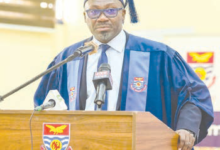Road users advised to obey directives at Tema Motoway

The Tema Motorway interchange was opened to traffic last Saturday, with a call on road users to read and correctly interpret signals posted at entry points, to avoid inconvenience and accidents.
The Tema Regional Motor Traffic and Transport Department Commander (MTTD) Assistant Commissioner of Police (ACP) Joe Owusu-Bempah, who made the call, also advised drivers against speeding at the intersection.
“It may take time for you to master the new road. Once you drive slowly and carefully, you should be able to ask for direction from the Motor Traffic Police or the Signal Men working on the road, when in doubt,” he said.
Drivers from Accra to Aflao and Aflao to Accra have easy access via the underground tunnel, while those from Accra to Tema harbour have easy traffic-free access as they use the road in front of the Southern Fried chicken restaurant among others, ACP Owusu-Bempah said, and urged all road users to obey instructions from the police and signal men to avert road crashes.
“We shall arrest and prosecute any motor rider and pillion rider here as this is against the social distancing rules,” he warned.
The road project, which commenced on February, 2018, is part of efforts to ease traffic congestion in the industrial city of Tema.
The project funded by the Japanese Government with a grant of US$55.6 million through the Japan International Cooperation Agency (JICA) and undertaken by Shimizu-Dai Nippon Joint Venture is scheduled to be completed in 28 months (June 2020).
It involved the construction of a 2.1 kilometre three-lane dual carriageway with 730-metre underpass and improvement of a 1.9 kilometre two-lane dual carriageway from Ashaiman Roundabout to the Harbour Road.
Additional construction involves service road ramps, retaining wall and box culvert, road base and pavement, pedestrian bridges and provision of road safety furniture to save lives and property.
Moments before the intersection was opened at 1:00 pm, the Project Manager, Yujin Uemura, conducted personnel of the MTTD round the project site, explaining what was expected of road users.
ACP Owusu-Bempah said some drivers mixed up lanes during the initial stages, indicating their failure to read and correctly follow road directional signs.
“Apart from that some drivers jumped some of the more than 10 traffic lights placed in close proximity,” he said.
ACP Owusu-Bempah urged drivers not to panic, but consult the police when they were in doubt as personnel would be on the ground to guide road users until they were familiar with the intersection.
Some drivers and commuters were, however, not happy that there were no bus stops near the interchange.
Samuel Adjei, a driver at the Tema-Ada station (motorway), expressed worry that the absence of a bus stop near the interchange meant passengers had to alight at further points, and walk quite a distance to access the Tema-Aflao station.
The Motorway forms an integral part of the Trans-Africa Highway, stretching from Lagos, Nigeria, through Lomé, Togo, Accra, Ghana, and Abidjan,Ivory Coast, to Dakar, Senegal, and effectively serves as the junction to the West African sub- region.
The phase two of the project would see the construction of a flyover on the Akosombo-Tema Harbour Road.






